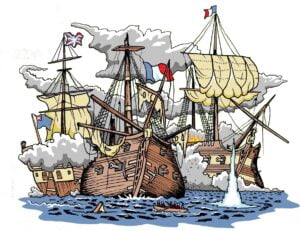 One of the greatest military leaders in history and emperor of France, he conquered much of Europe.
One of the greatest military leaders in history and emperor of France, he conquered much of Europe.
Napoleon Bonaparte was born on 15th of August 1769 in Ajaccio, on the Mediterranean island of Corsica. He was one of eight surviving children and his family were minor Corsican nobility, with his father being a lawyer. Even so they were not wealthy.
He was educated at military school on the French mainland, and after this he became a second lieutenant in an artillery regiment in the army. During the French revolution which started in 1789 he was mainly at home on Corsica.
Over the three years of the revolution the monarchy in France was overthrown and replaced by a French republic ruled by a group of officials known as the French Directory.
Napoleon then returned to France, where he was rapidly promoted and in 1796, was made commander of the French army in Italy, where he forced Austria and its allies to make peace. In 1798, Napoleon conquered Ottoman-ruled Egypt in an attempt to strike at British trade routes with India. He was stranded when his fleet was destroyed by the British at the Battle of the Nile.
In November 1799, in an event known as the coup of 18 Brumaire, Napoleon was part of a group that successfully overthrew the French Directory.
After a fairly meteoric rise to power, he became emperor of France in 1804.
Once in power he:
- oversaw the centralisation of government
- the creation of the Bank of France
- the reinstatement of Roman Catholicism as the state religion
- Reformed the countries law and created the Code Napoleon, still French law today.
 In 1800, he defeated the Austrians at Marengo. He then negotiated a general European peace, which established French power on the continent. In 1803, Britain resumed its war with France, later joined by Russia and Austria. Britain inflicted a decisive naval defeat on the French at Trafalgar in 1805, which meant Napoleon had to abandoned his plans to invade England. He then turned on the Austro-Russian forces, defeating them at Austerlitz, later that same year. He gained new territory, including annexation of Prussian lands, which ostensibly gave him control of Europe.
In 1800, he defeated the Austrians at Marengo. He then negotiated a general European peace, which established French power on the continent. In 1803, Britain resumed its war with France, later joined by Russia and Austria. Britain inflicted a decisive naval defeat on the French at Trafalgar in 1805, which meant Napoleon had to abandoned his plans to invade England. He then turned on the Austro-Russian forces, defeating them at Austerlitz, later that same year. He gained new territory, including annexation of Prussian lands, which ostensibly gave him control of Europe.
The Holy Roman Empire was dissolved, Holland and Westphalia created, and over the next five years, Napoleon’s relatives, friends and loyalists were installed as leaders in Holland, Westphalia, Italy, Naples, and Spain.
In 1810, he had his marriage to Josephine de Beauharnais annulled and married the daughter of the Austrian emperor in the hope of having an heir. With his son, Napoleon, being born a year later.
The Peninsular War began in 1808. Costly French defeats over the next five years drained French military resources. Napoleon then in 1812 decided to invade Russia, which led to a disastrous retreat. The tide started to turn in favour of the allies and in March 1814, they occupied Paris. Napoleon went into exile on the Mediterranean island of Elba.
In March 1815 he escaped and marched on the French capital. The Battle of Waterloo ended his brief second reign. The British imprisoned him on the remote Atlantic island of St Helena, where he died on 5 May 1821.
 That pesky Napoleon tried to invade Britain several times. Our sister site, Educational Musicals, have created a fabulous children’s musical about one such attempt.
That pesky Napoleon tried to invade Britain several times. Our sister site, Educational Musicals, have created a fabulous children’s musical about one such attempt.
It is called TRAFALGAR – Nelson’s finest hour, you can be downloaded it by clicking on TRAFALGAR – Nelson’s finest hour
It has a great, fun script and 12 catchy songs your children will just love performing.
Isn’t History Fun?
For more on this go to:
https://www.britannica.com/biography/Napoleon-I/The-Directory
https://www.history.com/topics/european-history/napoleon
https://www.ngv.vic.gov.au/napoleon/napoleon-and-josephine/who-was-napoleon.html
© Anthony James

